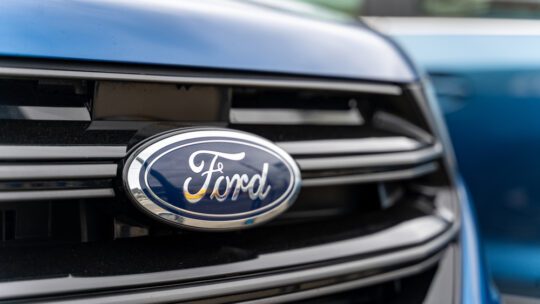
This week's PR Roundup looks at Ford Motor Company's marketing campaign introducing "employee pricing" for vehicles amid auto tariffs and a report that ranks the DEI and sustainability communications put forth by the world's most influential brands.
Ford Announces Price Discounts for Vehicles in the Nick of Tariff Time
What Happened: A 25% tariff on imported vehicles—a policy that President Trump claims will increase investment and jobs in the U.S. but is likely to cause price increases on new cars—took effect on Thursday, April 3. On the same day, Ford Motor Company launched a new ad campaign touting a plan to offer deep price discounts on its vehicles.
Dubbed “From America, For America” and featuring a voiceover from actor Bryan Cranston, the commercial promises to give customers the benefit of “employee pricing” for many of its vehicles, including most 2024 and 2025 models, through June 2.
“Consumers will pay what we pay,” said Rob Kaffl, Ford’s Director of U.S. Sales and Dealer Relations, in a blog post. The company is also extending its Ford Power Promise program for buyers of new electric models, which includes a free home charger with complimentary installation.
Ford says it is offering the discount due to an abundance of new vehicle inventory at dealerships, according to various news outlets, including the Detroit Free Press. In the auto sector overall, sales at car dealerships across the country—including Ford, Hyundai and General Motors—rose significantly in March and in the first quarter of 2025, ahead of this week's looming tariffs.
Communication takeaways: The announcement of Ford’s price discounts, which coincided with President Trump’s steep auto tariffs, is a clear strategic move by the brand to capitalize on its U.S. manufacturing roots and boost sales, at a time when prices for imported vehicles are poised to rise and global economic uncertainty—compounded by the Trump administration’s “Liberation Day” reciprocal tariffs for 180 countries announced April 2—reaches a fever pitch.
“The response is certainly strategic,” says Shannon Mulaire, Director, PR & Media Relations, at marketing and comms agency Nickerson. “Ford's position as a U.S.-based automaker provides it with a unique advantage, particularly in the short term, as many other automakers import vehicles.”
But the timing of the announcement bears some risk for Ford, she says, as it “feels politically-motivated.”
“Ford has always touted being made in the U.S., so while this is more overt with the timing, it’s not necessarily a departure from their typical marketing," Mulaire says. "What they need to watch is the assumption that this marketing means they support the tariffs. While their CEO has said that Ford supports the President’s vision of strengthening the auto industry rather than the tariffs themselves, there is a real possibility that the public may perceive this as a political statement, regardless of the intended message.”
In the end, discounting prices in this geo-political moment may lead to the intended outcome—a spike in auto sales. But at present, Mulaire notes, it’s “a savvy strategy to capitalize on the current circumstances, while framing it as simply an effort to support Americans in purchasing vehicles.”
Johnson & Johnson and Microsoft Top Rankings for DEI and Sustainability Messaging
What Happened: UK-based media intelligence company Onclusive released its latest Brand Influence Report, which examines how some of the world’s most influential companies are shaping public perception through their global corporate communications in two areas: sustainability and DEI. The report assesses brands’ effectiveness at communicating initiatives and how they are perceived through media coverage.
Key findings of the report include:
- Johnson & Johnson is the top-ranked company in DEI communications worldwide.
- Microsoft is the leader in sustainability communications, having committed to becoming carbon negative by 2030 and to removing all historical carbon emissions by 2050.
- Among the top 10 influential brands, Apple holds the highest DEI score (89/100) and Walmart holds the worst (5/100). Meta has also fallen behind (8/100), as has McDonald’s (22/100).
- Despite its low DEI (6/100) and sustainability (7/100) scores, YouTube tops global influence rankings.
Communication takeaways: The series of executive orders issued by President Trump designed to eradicate Diversity, Equity and Inclusion programs within the federal government have had far-reaching effects. Several global corporations, including Walmart, McDonald’s and Meta, have scaled back DEI initiatives, while others, such as SAP, Procter & Gamble and Cisco, have doubled down on their support.
According to Jack Richards, Global Head of Integrated & Field Marketing at Onclusive, it’s critical for communications to communicate a strategy to the public.
“It’s clear for marketers, PRs and communication professionals, the current landscape requires a clear and defined strategy," he says. "Without crafting a credible narrative even the strongest DEI and sustainability initiatives can be overlooked—or worse, misinterpreted. Brands have to take a proactive approach, stay ahead of emerging narratives and engage with stakeholders in meaningful ways in order to shape public perception rather than being shaped by it.”
Importantly, the business case for DEI and sustainable remains, says Jasmin Hartmeier, Senior Director of Public Relations at Chemistry Cultura.
“When organizations prioritize DEI and sustainability programs, the data shows that organizations attract unmatched talent," she says. "Such programs encourage a spirit of bold innovation across the company. And, when external stakeholders and customers are represented, the organization wins their business."
Protecting DEI over the long term requires a reimagining of how these stories are communicated, Hartmeier says, and recommends the following solutions:
Conduct an audit of how employees view a company’s DEI communications. Take that raw employee feedback and draft DEI guidelines, resulting in an evergreen document that is consistently updated and circulated.
Share messaging with a DEI Task Force—which includes diverse perspectives—for review, allowing for transparent feedback.
Rename the DEI team. An example from Hartmeier: "the Engagement and Community team." “The term “equity” in DEI stirs confusion for many, which is why DEI teams across the country have been renaming their teams and choosing a new team name that is seemingly more approachable,” she says.
Kaylee Hultgren is Content Director for PRNEWS.
